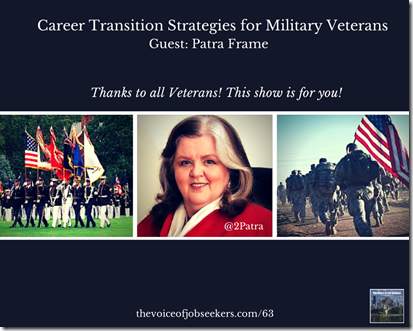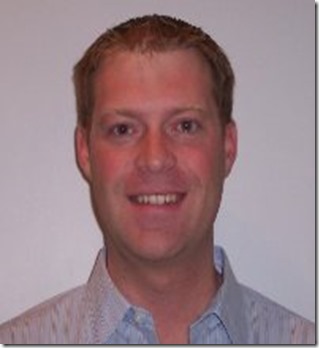
Podcast: Play in new window | Download | Embed
Subscribe: Apple Podcasts | RSS
This Veterans Day episode is dedicated to all of you who served our country. We thank you because you sacrificed your comfort, family, and yourselves to make sure that the rest of America can enjoy their freedom that we often take for granted.
The transition back to civilian life is not an easy task. For many veterans, transitioning back to the civilian job market is a nightmare. Are you a military veteran challenged by the competition or the lack of career resources? What is the toughest part of your career transition from serving to civilian?
There are three ways you can let me know:
Blog: TheVoiceofJobSeekers.com (Use the send voicemail feature)
Email: [email protected]
Voicemail: 708.365.9822
My guest today is Patricia Frame (@2Patra). As an Air Force Veteran herself has extensive experience as a Human Resource expert. She has trained more than 1,800 hiring managers in effective hiring and talent management processes and actions. She was recommended as a guest from Susan P. Joyce, a guest back from late summer. Patricia is the founder of PatraFrame.com and Veterans’ job expert at job-hunt.org.
Here are a few of the highlights from our conversation:
- One of the differences from past military transitions is now career training is provided for all Veterans’ before leaving the military. The bad side that too many Veterans wait for the training and not doing anything for their job search before instruction begins
- Patricia noted that many Veterans’ miss the intense camaraderie they experienced through combat making it hard to transition back to civilian life. Very few civilian workplaces can replicate the teamwork a Veteran experienced before leaving
- One of the common mistakes Veterans’ make on LinkedIn is posting their military pictures. She said that is an indication that they are not ready for a career transition back to the civilian world. Employers also pick that up all because a soldier wants people to see their “fruit salad (military ribbons and décor)” and rank
- Patricia stated that people need to think of their LinkedIn profile as an advertisement. For example putting “Retired” sends the wrong message to recruiters and employers. We agreed that a common error among Veterans’ is not speaking the language of civilian employers
- Don’t forget the importance of showcasing soft skills and achievements through writing and speaking, especially when the job you performed was classified
Resources mentioned:
Type “Troops to…” in the Google search engine filled by the profession you desire will populate with many choices (many of them free). Training is often sponsored by companies and trade associations
Microsoft (free training available)
SAP (Veterans to Work program)
General ElectricSyracuse University for Veterans and Military Families
Veterans Tuition Credit Program
American Corporate Partners (mentoring and career advice)
Next week I will have a PDF with additional resources to find listings, programs, and directories to help those veterans that need additional help! Email me at [email protected] to be put on the list.
Have a great week!
About Mark Anthony Dyson
I am the "The Voice of Job Seekers!" I offer compassionate career and job search advice as I hack and re-imagine the job search process. You need to be "the prescription to an employer's job description." You must be solution-oriented and work in positions in companies where you are the remedy. Your job search must be a lifestyle, and your career must be in front of you constantly. You can no longer shed your aspirations at the change seasons. There are strengths you have that need constant use and development. Be sure you sign up to download my E-Book, "421 Modern Job Search Tips 2021!" You can find my career advice and work in media outlets such as Forbes, Inc., Fast Company, Harvard Business Review, Glassdoor, and many other outlets.





